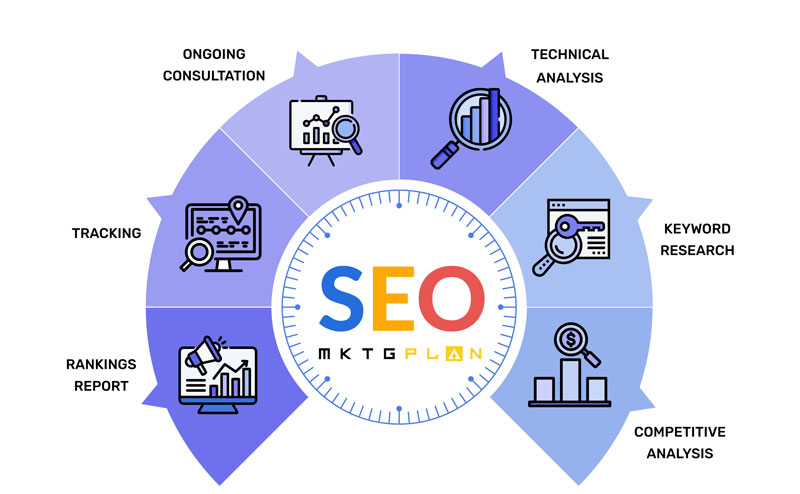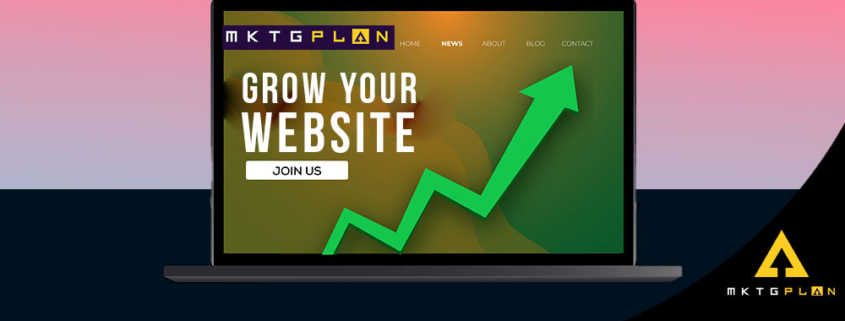How to Implement Growth Strategies to your Website
In the digital age, having a strong online presence is crucial for businesses of all sizes, and implementing growth strategies on your website is key to achieving this. Whether you’re a small startup or an established company, growing your website effectively can lead to increased visibility, more traffic, and higher conversions. This article will delve into the various strategies and practices that can help you grow your website. We will cover key areas including digital marketing, search engine optimization, and web design, and provide actionable tips to ensure your website thrives in a competitive online environment.
Setting Clear and Measurable Goals
Implementing growth strategies for your website involves a series of deliberate and well-planned actions. Start by setting clear and measurable goals that define what success looks like for your site, such as increasing traffic, improving user engagement, or boosting conversion rates. Conduct a thorough SEO audit to identify strengths and areas for improvement, ensuring that your site is optimized for search engines. Develop a content calendar to maintain a consistent flow of high-quality, relevant content that resonates with your target audience. Prioritize mobile optimization to ensure your site is accessible and user-friendly on all devices. Leverage social media to amplify your content and engage with your audience, building a community around your brand. Utilize analytics tools to track performance and gain insights, allowing you to make data-driven decisions.
Understanding the Basics of Website Growth
Before diving into specific strategies, it’s essential to understand the fundamentals of website growth. Website growth is about increasing your site’s traffic, improving user engagement, and ultimately driving conversions. This involves a blend of technical and creative approaches, including:
- Search Engine Optimization (SEO): Optimizing your website to rank higher in search engine results.
- Content Marketing: Creating valuable content to attract and retain visitors.
- Social Media Marketing: Using social media platforms to promote your website.
- Email Marketing: Leveraging email to communicate with potential and existing customers.
- Paid Advertising: Investing in paid ads to drive traffic.
- User Experience (UX): Ensuring your website is user-friendly and engaging.
Growing Your Website with a Digital Marketing Agency
To grow a website is hard work every day and requires a lot of time because it is very complicated. To help with growth, it would be beneficial to consider hiring a digital marketing agency. These agencies specialize in various aspects of online marketing and can provide the expertise and resources needed to enhance your website’s performance. Here are some key benefits of working with a digital marketing agency:
- Expertise and Experience: Digital marketing agencies have teams of experts who are well-versed in the latest marketing trends and techniques.
- Time-Saving: By outsourcing your marketing efforts, you can focus on other critical aspects of your business.
- Access to Advanced Tools: Agencies use advanced marketing tools and software that can provide deeper insights and better results.
- Customized Strategies: Agencies can tailor their strategies to meet your specific business needs and goals.
Search Engine Optimization (SEO)
Search engine optimization (SEO) is a critical component of website growth. SEO involves optimizing your website so that it ranks higher in search engine results pages (SERPs). Here are some essential SEO practices:
- Keyword Research: Identify the keywords your target audience is searching for and incorporate them into your content.
- On-Page SEO: Optimize individual pages on your site, including meta tags, headers, and content.
- Off-Page SEO: Build backlinks from reputable websites to improve your site’s authority.
- Technical SEO: Ensure your website is technically sound with a fast loading speed, mobile-friendliness, and secure connections (HTTPS).
- Content Creation: Produce high-quality, relevant content that provides value to your visitors.

It involves meticulous keyword research to identify terms your target audience is searching for, and optimizing your site’s content around these keywords. Regular tracking and analysis of your SEO efforts help you understand what strategies are working and where adjustments are needed. Additionally, competitive analysis allows you to monitor your competitors’ SEO tactics and stay ahead in the rankings.
Web Design
An effective web design is crucial for website growth. A well-designed website not only attracts visitors but also keeps them engaged and encourages them to take action. Here are some key elements of effective web design:
- User-Friendly Navigation: Ensure your website is easy to navigate with clear menus and a logical structure.
- Responsive Design: Your website should be accessible and functional on all devices, including desktops, tablets, and smartphones.
- Visual Appeal: Use high-quality images, videos, and graphics to make your website visually appealing.
- Clear Calls-to-Action (CTAs): Use CTAs to guide visitors towards desired actions, such as making a purchase or signing up for a newsletter.
- Fast Loading Speed: Optimize your website’s loading speed to reduce bounce rates and improve user experience.
Growing your website without strategy is like sailing without a compass. #DigitalMarketing #SEO #WebDesign #MKTGPlan
— MKTG Plan (@MKTGPlan) June 8, 2024
Content Marketing
Content marketing is a powerful strategy for growing your website. By creating and sharing valuable content, you can attract and retain a clearly defined audience. Here are some tips for effective content marketing:
- Blogging: Regularly publish blog posts on topics relevant to your audience.
- E-books and Whitepapers: Offer in-depth content that provides valuable insights and information.
- Infographics: Use infographics to present data and information in a visually appealing format.
- Videos: Create videos to engage your audience and provide valuable content in an easily digestible format.
- Social Media Content: Share your content on social media platforms to reach a wider audience.
Social Media Marketing
Social media platforms are excellent tools for promoting your website and engaging with your audience. Here are some tips for effective social media marketing:
- Choose the Right Platforms: Focus on the social media platforms that are most relevant to your audience.
- Post Regularly: Maintain a consistent posting schedule to keep your audience engaged.
- Engage with Your Audience: Respond to comments and messages, and interact with your followers.
- Use Hashtags: Use relevant hashtags to increase the visibility of your posts.
- Run Paid Ads: Invest in paid social media advertising to reach a larger audience and drive traffic to your website.
To maximize your social media marketing efforts, start by choosing the right platforms that align with your audience’s preferences. Maintain a consistent posting schedule to keep your followers engaged and always interact by responding to comments and messages.

Email Marketing
Email marketing is a highly effective way to communicate with your audience and drive traffic to your website. Here are some tips for successful email marketing:
- Build a Quality Email List: Focus on building an email list of engaged and interested subscribers.
- Personalize Your Emails: Personalize your emails to make them more relevant and engaging for your recipients.
- Use Compelling Subject Lines: Craft compelling subject lines to increase your email open rates.
- Include Clear CTAs: Include clear and enticing calls-to-action in your emails to encourage clicks.
- Analyze and Optimize: Regularly analyze your email marketing performance and make adjustments to improve your results.
Paid Advertising
Paid advertising can be an effective way to quickly grow your website. Here are some common forms of paid advertising:
- Pay-Per-Click (PPC) Advertising: Use PPC ads to appear in search engine results for specific keywords.
- Social Media Ads: Run ads on social media platforms to reach a wider audience.
- Display Ads: Use display ads to promote your website on other websites and blogs.
- Retargeting Ads: Use retargeting ads to re-engage visitors who have previously visited your website.
Analytics and Optimization
To grow your website effectively, it’s essential to track your performance and make data-driven decisions. Here are some key metrics to monitor:
- Traffic: Track the number of visitors to your website and identify the sources of traffic.
- Bounce Rate: Monitor your bounce rate to understand how many visitors leave your site without engaging.
- Conversion Rate: Track your conversion rate to measure the effectiveness of your website in driving desired actions.
- Engagement: Monitor engagement metrics, such as time on site and pages per session, to understand how visitors interact with your site.
- SEO Performance: Track your rankings for key SEO keywords and monitor changes over time.
How to Implement Growth Strategies to your Website
Implementing growth strategies can be broken down into several actionable steps:
- Set Clear Goals
Define what you want to achieve with your website (increased traffic, higher conversions)
- Optimize for Mobile
Ensure your website is mobile-friendly and performs well on all devices
- Social Media
Create a social media strategy to promote your content and engage with your audience.
- Conduct an SEO Audit
Evaluate your current SEO performance and identify areas for improvement.
- Use Analytics Tools
Utilize tools like Google Analytics to track performance and gain insights.
- Test and Iterate
Continuously test different strategies and make adjustments based on data and feedback
Frequently Asked Questions (FAQs)
SEO is a long-term strategy, and it typically takes several months to start seeing significant results. However, consistent effort and optimization can lead to sustained growth over time.
There isn’t a one-size-fits-all answer, as the best approach depends on your audience and goals. A combination of SEO, content marketing, social media marketing, and paid advertising is generally effective.
obile optimization is crucial, as a significant portion of web traffic comes from mobile devices. A mobile-friendly website ensures a better user experience and can positively impact your SEO rankings.
Both organic and paid traffic are important. Organic traffic provides long-term sustainability, while paid traffic can deliver quick results. Balancing both can lead to comprehensive growth.


